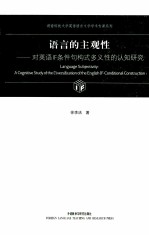
- 作 者:徐李洁著
- 出 版 社:北京:外语教学与研究出版社
- 出版年份:2008
- ISBN:9787560076324
- 标注页数:149 页
- PDF页数:165 页
请阅读订购服务说明与试读!
订购服务说明
1、本站所有的书默认都是PDF格式,该格式图书只能阅读和打印,不能再次编辑。
2、除分上下册或者多册的情况下,一般PDF页数一定要大于标注页数才建议下单购买。【本资源165 ≥149页】
图书下载及付费说明
1、所有的电子图书为PDF格式,支持电脑、手机、平板等各类电子设备阅读;可以任意拷贝文件到不同的阅读设备里进行阅读。
2、电子图书在提交订单后一般半小时内处理完成,最晚48小时内处理完成。(非工作日购买会延迟)
3、所有的电子图书都是原书直接扫描方式制作而成。
Chapter 1 Introduction 1
1.1 Diversified Interpretations of the English If-Conditional Construction 2
1.2 Conditionals and If-Conditionals 5
1.3 Research Questions 7
1.4 Methodology and Procedures 8
1.5 Structure of the Book 9
Chapter 2 The Historical Background 11
2.1 Major Approaches to the If-Conditional Construction 12
2.1.1 Logic-semantic Approach 12
2.1.2 Functional-pragmatic Approach 15
2.1.3 Cognitive Approach 18
2.1.4 Brief Evaluation:Approaches and Problems 20
2.2 Typological Classifications of the If-Conditional Construction 22
2.2.1 Formal Term 22
2.2.2 Semantic Term 23
2.2.3 Epistemic Term 25
2.2.4 Sweetser's Three-domain Theory 27
2.3 Summary 30
Chapter 3 Theoretical Prerequisites 31
3.1 Recent Studies on Subjectivity and Subjectivisation 31
3.1.1 Traugott's View of Subjectivisation 35
3.1.2 Langacker's View of Subjectivisation 41
3.2 Establishment of the Model for the Analysis of Subjectivisation of If-Conditional Construction 44
3.2.1 Subjectivity 44
3.2.2 Rationale of the Model 45
3.2.2.1 Cognitive Foundation 45
3.2.2.2 Psychological Foundation 49
3.2.2.3 Linguistic Foundation 51
3.2.3 The Model 52
3.2.4 The Process of Subjectivisation 53
3.2.5 The Significance of the Model 59
3.3 Summary 60
Chapter 4 The Prototypical If-Conditional Construction 61
4.1 Conditions in Logic 61
4.2 Conditions and If-Conditional Construction 65
4.3 Transmutations of Conditions 69
4.4 The Prototypical If-Conditional Construction 72
4.4.1 Semantic Feature—Causal Relation 73
4.4.2 Syntactic Feature 77
4.4.2.1 Verb Form 78
4.4.2.2 Clause Order 81
4.4.3 Pragmatic Feature 84
4.4.3.1 Non-assertiveness of the Antecedent 85
4.4.3.2 The Determinant Role of Pragmatic Contexts 86
4.5 Summary 88
Chapter 5 Subjectivisation in Epistemic If-Conditional Construction 90
5.1 Epistemic Raising 90
5.2 Semantic Relations in Epistemic If-Conditionals 93
5.2.1 Premise-conclusion Relation 93
5.2.2 Statement-comment Relation 96
5.2.3 Statement-explanation Relation 99
5.3 Syntactic Feature 102
5.3.1 Verb Form 102
5.3.2 Clause Order 104
5.4 Pragmatic Feature 105
5.4.1 Antecedent as a Topic Marker 105
5.4.2 Antecedents as Discourse-bounded 107
5.5 Summaryv 110
Chapter 6 Subjectivisation in Speech-Act If-Conditional Construction 111
6.1 Common Features with Epistemic If-Conditionals 111
6.1.1 Indirect and Implicit Conditional Relation 112
6.1.2 Verb Form 114
6.1.3 Clause Order 116
6.1.4 Antecedent as a Topic Marker 117
6.2 Pragmatic Feature Peculiar to Speech-Act If-Conditionals 119
6.2.1 Felicity Conditions and Speech-Act Conditionals 119
6.2.1.1 A Briering ofFelicity Condition 119
6.2.1.2 Felicity Conditions Encoded in the Antecedent 120
6.2.2 Politeness and Speech-Act Conditionals 123
6.2.2.1 Formulaic Polite Expressions 123
6.2.2.2 Strategic Polite Expressions 127
6.3 Subjectivity Indicated in the Speaker's Commitment to the Antecedent 129
6.4 Summary 132
Chapter 7 Summary and Conclusions 134
7.1 Major Findings 134
7.2 Theoretical Implications 137
7.3 Further Research 138
References 141
